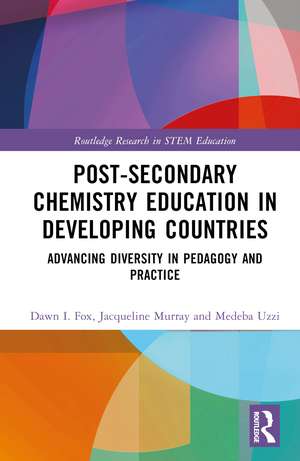Post-Secondary Chemistry Education in Developing Countries: Advancing Diversity in Pedagogy and Practice: Routledge Research in STEM Education
Autor Dawn I. Fox, Medeba Uzzi, Jacqueline Murrayen Limba Engleză Hardback – 25 mar 2024
Taking Guyana as a case study, it pays particular attention to local challenges facing such territories, including human and financial resource shortages, tension between quality and quantity of graduates, cultural inequalities, unequal access to increasingly important Information and Communication Technology or Technologies (ICTs), and increasing competition from international universities in the developed world. Written by a team with over 70 years in combined teaching experience, it asks whether these challenges can be met and overcome and considers how tertiary chemistry education can better meet the rapidly changing needs of society. The authors examine the status quo of tertiary chemistry education in Guyana against the introductory backdrop of the internal and external stresses on the education system, before exploring selected best practices grounded in a three-pronged model focused on pedagogy, programming, and people. Advancing diversity on each of these levels, the book ultimately shows how this framework can support better learning and teaching, and the development of a better equipped and more diverse Science, Technology, Engineering and Mathematics (STEM) workforce.
It will appeal to scholars, researchers, graduate students, and tertiary level curriculum developers in chemistry education, interested in an innovative, holistic approach for transforming chemistry teaching that focuses on pedagogical diversity, strategic co-curricular programming, and accommodating diversity and diverse learning styles in the classroom.
Preț: 1028.00 lei
Preț vechi: 1253.66 lei
-18% Nou
Puncte Express: 1542
Preț estimativ în valută:
196.71€ • 205.90$ • 163.72£
196.71€ • 205.90$ • 163.72£
Carte tipărită la comandă
Livrare economică 31 martie-14 aprilie
Preluare comenzi: 021 569.72.76
Specificații
ISBN-13: 9781032395791
ISBN-10: 1032395796
Pagini: 220
Ilustrații: 9 Tables, black and white; 2 Line drawings, black and white; 2 Illustrations, black and white
Dimensiuni: 152 x 229 x 14 mm
Greutate: 1.25 kg
Ediția:1
Editura: Taylor & Francis
Colecția Routledge
Seria Routledge Research in STEM Education
Locul publicării:Oxford, United Kingdom
ISBN-10: 1032395796
Pagini: 220
Ilustrații: 9 Tables, black and white; 2 Line drawings, black and white; 2 Illustrations, black and white
Dimensiuni: 152 x 229 x 14 mm
Greutate: 1.25 kg
Ediția:1
Editura: Taylor & Francis
Colecția Routledge
Seria Routledge Research in STEM Education
Locul publicării:Oxford, United Kingdom
Public țintă
PostgraduateCuprins
Introduction 1. Contemporary Forces Reshaping the Landscape of Chemistry Education 2. Introducing the 3P Approach: Diversifying Pedagogy, Programming, and People for Transformative Chemistry Education Section One: Diversifying Pedagogy in Post-Secondary Chemistry Education 3. Active Teaching and Learning Methods in Chemistry Education 4. Effective Teaching Strategies for a Large, Diverse Class of Tertiary Students 5. Transforming the Chemistry Classroom with Flipped Teaching 6. Transforming the Chemistry Practical: From Recipe to Inquiry Section Two: Diversifying Programming in Post-Secondary Chemistry Education 7. Outside the Classroom: Authentic and Strategic Experiences to Build Transferable Soft Skills 8. Making Connections: Diversifying Disciplinarity and Embracing Emerging Paradigms Section Three: Supporting Diverse People in Post-Secondary Chemistry Education 9. Towards a more Inclusive Chemistry Classroom: Embracing our Students 10. Towards a more Inclusive Chemistry Classroom: Supporting our Teachers Conclusion 11. A Look Ahead: Charting the Future
Notă biografică
Dawn I. Fox is Senior Lecturer in the Department of Chemistry at the University of Guyana.
Medeba Uzzi is General Chemist and Chemistry Educator within the Department of Chemistry, University of Guyana.
Jacqueline Murray is the Director of the Institute of Distance and Continuing Education, University of Guyana.
Medeba Uzzi is General Chemist and Chemistry Educator within the Department of Chemistry, University of Guyana.
Jacqueline Murray is the Director of the Institute of Distance and Continuing Education, University of Guyana.
Descriere
This book considers how post-secondary chemistry education can be advanced in developing countries in order to better respond to emerging global, regional, and local needs, with particular attention to accommodating diversity and diverse learning styles.














